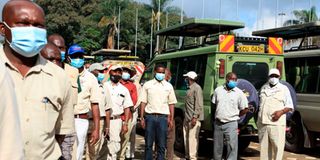Kenya backs US move on vaccine patents

Tour drivers and guides queue to be vaccinated against coronavirus at Kenyatta International Convention Centre, Nairobi, on April 27. Supply of the vaccines has fallen worldwide.
The government has welcomed the United States’ support for a waiver on patent protection for Covid-19 vaccines, saying it is a generous move.
Health Cabinet Secretary Mutahi Kagwe said Kenya has been advocating for the waiver for a long time as it presents an opportunity for the manufacture of more vaccine doses.
“This is especially welcome, considering that most developing countries have been experiencing supply disruptions occasioned by vaccine nationalism,” Mr Kagwe said.
Kenya, he added, is developing programmes that will make it possible to produce vaccines locally starting with a fill and finish infrastructure.
“The US voice adds to more than 60 others among World Trade Organisation (WTO) members and marks steps towards increased production of vaccines to meet the global demand,” the minister added.
He challenged Kenyan manufacturers to intensify their efforts and develop capacity for the production of vaccines.
“We want to do this quickly. This is the best news ever. History will remember the decision by the US government to fight a global pandemic,” Mr Kagwe said.
Covid-19 vaccines
The European Union (EU) said it is open to discussions on waiving intellectual property protection for Covid-19 vaccines.
The same position has been taken by African Union (AU), which termed the call a “remarkable expression of leadership’’.
The two organisations said allowing the production of generic vaccines would boost distribution in poor countries that are struggling to fight the coronavirus.
However, the waiver is not expected immediately since it has to be approved by the WTO.
Pharmaceutical companies in the US, Germany and several other developed countries have opposed the patent waiver.
A patent is the government authority or licence giving a right or title for a set period – especially the sole right to exclude others from making, using or selling an invention or product – and allow the originator to cover the costs of development and encourage investment.
If the intellectual rules are overridden, countries can start making the generic versions of coronavirus vaccines and medicines without the risk of being sued by firms that own the property.
The call for a vaccine patent waiver comes as Kenya faces acute shortages.
Ministry of Health officials are not sure when the country is likely to get its second batch of the AstraZeneca vaccine.
The government is now looking at other options, including the Pfizer and Johnson&Johnson vaccines.
Kenya has vaccinated 911,515 people against coronavirus.
The country has extended the time for getting the second dose from eight to 12 weeks. Kenya depends on the Covax facility for the supply of vaccines from the Serum Institute of India.
India, the world’s largest vaccine producer, is running out of supplies to make life-saving doses for its people following a surge in coronavirus in recent months, with the daily death toll at more than 4,000. This has affected Kenya and many other counties.
India has cancelled the export of vaccines as it grapples with the fast rising Covid-19 infections. It has also fallen far behind on its vaccination targets.
Should there be a patent waiver, low income countries or nations that have the capacity to manufacture the drugs would not have to queue while pharmaceutical companies take orders from wealthy states.
“This is a global health crisis and the extraordinary circumstances of the pandemic call for extraordinary measures,” US Trade Representative Katherine Tai said while announcing the waiver.
She said the President Joe Biden administration believes in intellectual protection but supports the patent waiver “in the service of ending this pandemic”.
The United Kingdom has begun discussions with the US and the WTO on how to increase the production and supply of vaccines.
In November last year, India and South Africa proposed a waiver on certain provisions of WTO trade-related aspects of intellectual property rights.
More than 100 other countries, Kenya included, supported the call.
EU countries and drug manufacturers, including Pfizer and Moderna, are opposed to the patent waiver.
They say easing patent rules could backfire and create more backlog for vaccine ingredients and response to emerging Covid-19 variants.
Legal risks
Experts say the waiver does not offer a blanket solution. It would take long for governments to set up factories, train personnel and procure materials to make the vaccines.
Once all WTO members agree, the next step would be for countries to implement the waiver at national level by removing legal risks that hinder production and supply.
The 164 WTO member states and a panel on intellectual property are expected to discuss the matter in June.
World Health Organization head Tedros Adhanom Ghebreyesus called the US decision “historic”, adding that it “marks a monumental moment in the fight against Covid-19”.
The sentiments were echoed by Africa Centres for Disease Control and Prevention director John Nkengasong.
“History will remember the US government as having done the right thing at the right time,” Dr Nkengasong said.
“This development is a step in the right direction.





